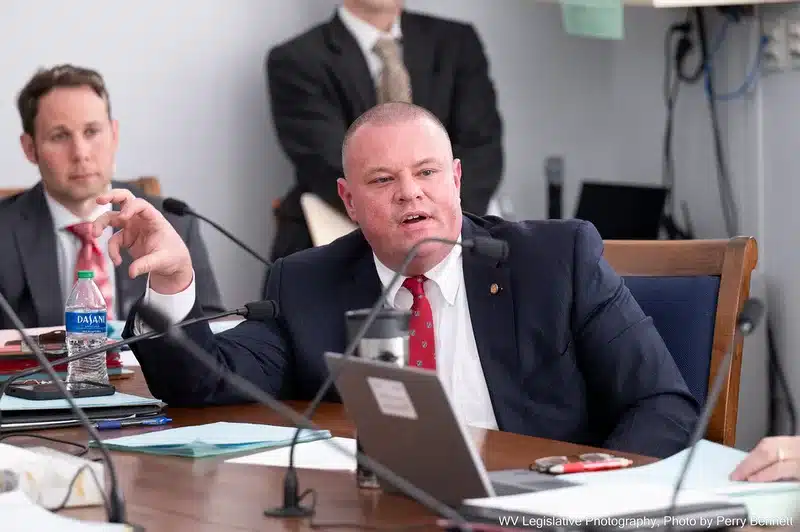BY: LORI KERSEY
A House of Delegates committee on Wednesday advanced a bill that would prohibit the state Division of Corrections from publishing the booking photos of people who have not been convicted of crimes.
The legislation would remove booking photographs from the public record and make them not subject to the Freedom of Information Act and may not be disseminated or published online unless: the person is a fugitive and publishing the photo would help apprehend the person, the individual is an imminent threat to the public or an individual’s safety or a judge orders the photo’s release.
The name, date of birth and charges of the person who was arrested would still be available on the division’s website.
House Bill 4621 would also require websites that publish mugshots and take payments to remove them remove those photos from publication within seven days of a person’s request to do so.
The bill was approved on a voice vote. It will next go to the full House of Delegates for consideration.
Supporters of the bill argued that it’s a good way to protect people from having their mugshots distributed before they’re convicted of a crime.
Del. Brandon Steele, R-Raleigh, an attorney, argued against the bill, saying that mugshots help promote the health and safety of inmates, including at Southern Regional Jail, which has faced multiple lawsuits over alleged mistreatment.
“Knowing the problems that we have in Southern Regional Jail, in my district right now, we just had how many deaths this year?” he said. “And now we’re not going to let the public know what the people look like that are in there? That’s what we’re going to do with this bill.”
He said he believes part of his job in upholding and defending the constitution is a criminal defendant’s right to a fair, public trial.
“Anytime that we cease to inform the public that we’re taking away another citizen’s liberty, we’re running afoul of the very groundwork that was laid 250 years ago,” Steele said. “Now how does the booking photo fit into that? A booking photo fits into that because it shows the public this is a person that we have taken out of their home, out of their job, away from their family, and we’ve confined them. We’ve combined them in a place that, where I live, has experienced deaths at least once a month, that is under investigation for having people drinking water out of dog bowls and toilets.”
Steele added that the bill would “aid and assist the government in concealing who they have in custody.”
The House Judiciary Committee also sent to the full House of Delegates a bill that would expand the retention of DNA for law enforcement purposes. House Bill 4627 would require DNA collection of anyone convicted of a felony and some people arrested and charged with certain violent crimes, burglary and felony crimes involving children.
The bill would cost the state about $350,000 a year in added personnel costs.
The committee heard testimony from Ashley Spence, who survived a home invasion at age 19. Spence said she never saw the face of the man who nearly killed her. The case was cold for seven years until the perpetrator was identified and ultimately convicted through a DNA match in a crime database, she said.
The attack happened in Arizona, but the man was arrested in California, a state that requires a DNA sample is taken with every felony arrest.
Also Wednesday, the committee advanced a bill that would allow the Legislative Oversight Commission on Health and Human Resources Accountability to go into executive session for the purposes of discussing investigations of involving child abuse, nursing home abuse, hospital abuse, IDD waivers and adult protective services, a bill to increase criminal penalties for human trafficking and one that requires parents or guardians to participate in programs for juveniles in an out-of-home placement.
The committee removed from the agenda a bill that would have required that voters present a photo identification at polling places during elections.
Also on Wednesday, the West Virginia House of Delegates unanimously passed a bill that would exempt the acquisition of mobile facilities that perform mammography or low density computerized tomography from the requirement of a certificate of need.
Certificate of need is a state regulatory process for health care providers seeking to expand services.
Del. Amy Summers, chair of the House Committee on Health and Human Resources and a sponsor of the legislation, said the bill addresses the cost of the certificate of need fees for health care providers and helps people with transportation issues get to places that offer those services.
The House also unanimously passed a bill renaming the former Department of Health and Human Resources to the Department of Human Services, the Department of Health, and the Department of Health Facilities. Legislation passed in 2023 divided the agency into the three separate departments. That legislation became effective Jan. 1, 2024.
* West Virginia Watch is a nonprofit media source. Articles are shared under creative commons license. Please visit https://westvirginiawatch.com/ for more independent Mountain State news coverage.

